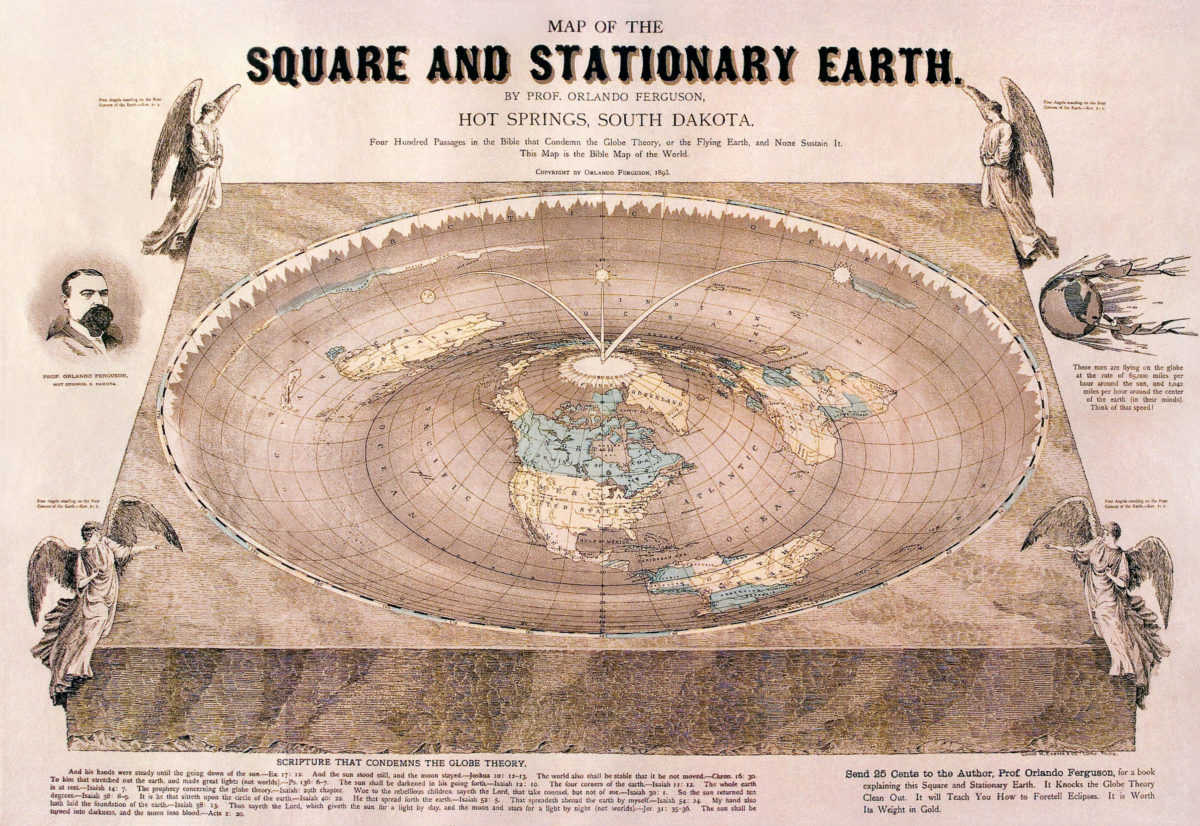Yesterday I came across a very interesting video presenting a debate between a scientist and a flat-earther (i.e. someone who believes the Earth is flat). These two guys were in their respective cliché at the higher extend: on the one hand, a 50-year-old bearded scientist, wearing faded unpaired suit that her wife imposed him in order to be presentable on TV ; on the other hand, a hyperactive young man wearing sneakers, a cap and a Nike t-shirt. The clash would have seemed unavoidable. However, these two challengers turned out to have more in common than expected at first glance. More precisely: they both share the same principles for guiding their seek for truth, but deduce different conclusions from these.
An interesting moment in the debate occurs when the scientist explains his opponent one of the very fundamental principles ruling science: the Ockham’s Razor. According to this principle, if two theories demonstrate the same explanatory power for a given set of facts, the scientist tends to choose the one with the less number of assumptions, the most economic one, the most reasonable one. The flat-earther wisely asks: what is the most reasonable between, on the one hand, a stationary and flat earth, and, on the other hand, a moving and spherical sphere? For sure a stationary and flat earth requires the less amount of assumption: we daily experience no curvature at all when looking at the horizon from a tower and we don’t feel seasick due to the rotation of the Earth. The Ockham’s Razor seems to give advantage to a flat earth theory. Flat-earther won this round.
However, the scientist would argue that we don’t have to trust our senses every time: we feel no motion because the motion of the Earth along its axis is no strong enough to be perceived by human body (but very sensitive experiments can detect it). Furthermore, at higher altitude (for instance in a plane), the curvature of the Earth appears clearly. So “perceptions are sometimes misleading in the scientific inquiry”, would conclude the scientist. With the same kind of argument, the flat-earther can reply that the perceived curvature of the Earth we experience in a plane by staring at the horizon is simply explained by the curvature of the cockpit’s glass. Thus, he does agree with the scientist about the claim that our senses are foolish. But this scepticism about perceptions leads to opposite conclusions. In the same idea, it is pretty outlandish that NASA did send humans in a box of metal 380 000 kms away from the Earth. The passengers experienced extreme temperatures, landed on a unknown piece of rock, walked freely on it and came back to Earth safely in the same box of metal, even if, only 60 years before, the first planes were unable to fly more than few metres without crashing deadly on the ground. For sure the hypothesis of an astronaut filmed in a swimming pool of a Hollywood studio is more plausible and requires a lot less scientific assumptions. Furthermore, during the Cold War epoch, so much was at stake for the US that it was very tempting for them to simulate a successful landing in a cinema studio instead of a taking the risk of a possible unexpected rocket explosion in the air. The flat-earther seems to have won this round again.
For the scientist, this advocacy could seem stupid: of course the NASA’s outstanding achievement can be explained by the huge amount of money spent in R&D during the Cold War and the round shape of the Earth has been confirmed by a lot of experiments… However the problem is still there : the scientist and the flat-earther use exactly the same epistemic principle for seeking the truth: the Ockham’s Razor. They both demonstrate a strong commitment in following this principle but deduce deeply different conclusions from it. This point is even more obvious when they both pretend to adopt scientific scepticism: observing the world, stating a theory, making predictions, ruling out this theory if the predictions contradict observations, trying to find a more adequate theory, etc. I do think that both of them are sincere and apply correctly this rule. The very difference maybe rests in the fact that the classical scientists have been applying this principle for many centuries, and statements that appear to follow this principle from the point of view of the flat-earther has been ruled out for ages by the scientists. Perhaps the flat-earther missed the train and the scientist’s one is twenty centuries ahead. I am not here pretending that the flat-earther lives in the Middle Ages and believes in fairies and dragons. I just state that he is indeed a scientist – he adopts the Ockham razor principle and he is not dogmatic thanks to his skeptic posture – but he is not taking into account the 2000 years of scientific heritage. He does everything by itself, relying on the application of fundamental scientific principles to his daily life.
Our flat-earther is like a DIY scientist, a self-made scientist, a liberalised scientist, a uberized scientist. Flat-earther is the enfant terrible of the scientific method, the illegitimate son of rational autonomy of thought, the best student of Mr Ockham’s class, the mandarin of the fundamental scientific principles. This nomad scientist assault the scientists’ strongest building in their inner foundations, forcing these scientists to argue both for and against their fundamental principles. And it is a good thing for two reasons. First, he insatiably wakes up the old queen Science from her lazy dominant position, from where she thinks that so obvious things such as planetary motion and evolution theory are graved in the stone forever. Then, Science is forced to urge her servants to renovate her kingdom’s foundation at every assault of the heretics. Second, the debate we depicted points out that science doesn’t rely on static and eternal epistemic principles but merely on temporal procedures inspired from these principles. Such procedures highly depend on the grounding historical context and modify their shape according to the state-of-art of that moment. These epistemic strategies are like chameleons fed by an inherited historical background of facts and theories. What is scientifically true is not a matter of rational reasoning but a matter of arrangement of previously collected data in such a way that it produces a coherent theory. Science has always argued a method, but how many books did she wrote about? Has anyone found a book titled “The art of doing science” or “Key principles to be a good scientist” in a library? The reason is, surprisingly enough, that science doesn’t have any systematic method per se. However, this lack of systematic methodology is not an Achilles heel but guarantees the robustness of the scientific inquiry. Good science can adapt its strategy in real time to solve more efficiently the problems it faces. This plastic method is indebted of ages of past scientific investigations. In contrast, the flat-earthers’ method starts from scratch again and again.
This paper draws the conclusion that the classical scientific inquiry cannot be only characterized by its use of a certain static set of epistemic principle (for instance, Ockham’s Razor), otherwise science should definitely agree with the flat earth theory. Instead, scientific inquiry uses a weaker version of these principles, fed by a background of past events, theories, observations and which has been conducted ages ago. There is no such thing as absolute scientific method. There is no method but a plastic one, always in movement and redefinition.


